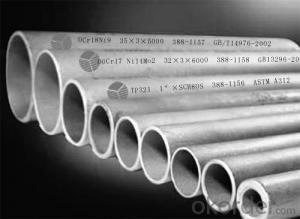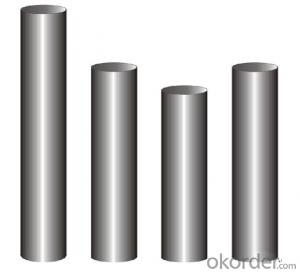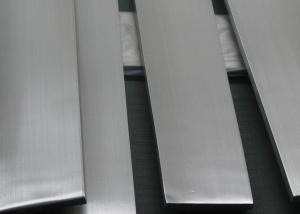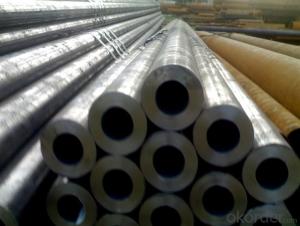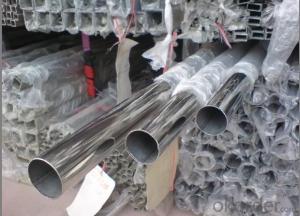Stainless Duplex Seamless Steel Pipe 31500
- Loading Port:
- Ningbo
- Payment Terms:
- TT OR LC
- Min Order Qty:
- 1 m.t.
- Supply Capability:
- 5000 m.t./month
OKorder Service Pledge
OKorder Financial Service
You Might Also Like
1、Structure of Stainless Duplex Seamless Steel Pipe 31500 Description:
Duplex Stainless steel pipe and tubing are used for a variety of reasons: to resist corrosion and oxidation, to resist high temperatures, for cleanliness and low maintenance costs, and to maintain the purity of materials which come In contact with stainless. The inherent characteristics of stainless steel permit the design of thin wall piping systems without fear of early failure due to corrosion.2、Main Features of the Duplex Seamless Steel Pipe 31500:
• High manufacturing accuracy
• High strength
• Small inertia resistance
• Strong heat dissipation ability
• Good visual effect
•Reasonable price
3、Duplex Seamless Steel Pipe 31500 Images:
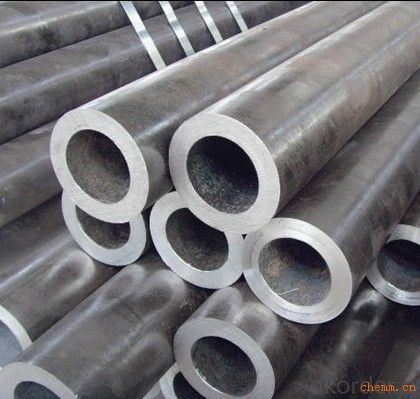
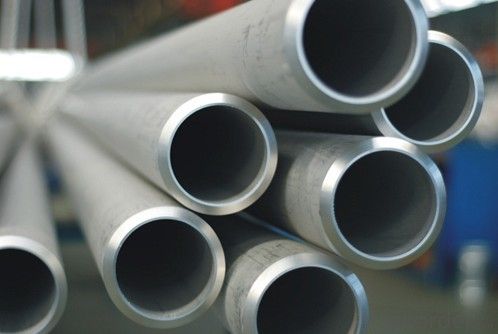
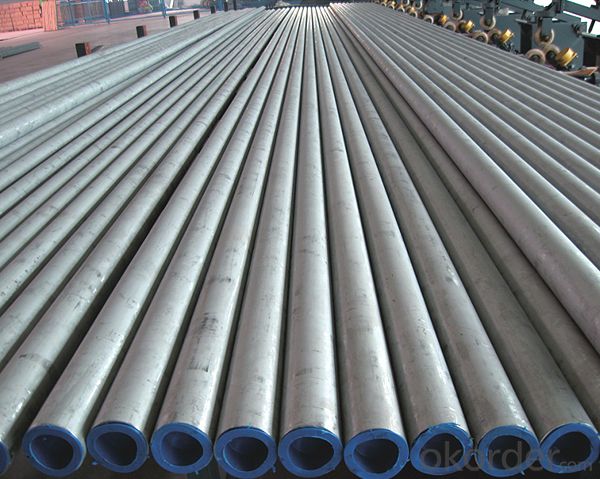
4、Duplex Seamless Steel Pipe 31500 Specification:
Detail infomation
Standards: ASTM/ASME A789/SA789, A790/SA790,A450,A530
Material: UNS S31803(Cr22Ni5Mo3/1.4462)/2205,UNS S32750(1.4410),UNS S31500(Cr18NiMo3Si2),
UNS32760(1.4501)
Chemical Composition
Grade | C max | Si max | Mn max | P max | S max | Cr | Ni | Mo | N |
UNS S32750 | 0.030 | 0.8 | 1.2 | 0.030 | 0.015 | 24.0-26.0 | 6.0-8.0 | 3.0-5.0 | 0.24-0.32 |
UNS S31803 | 0.030 | 1.0 | 2.0 | 0.020 | 0.020 | 21.0-23.0 | 4.5-6.5 | 2.5-3.5 | 0.08-0.20 |
UNS S31500 | 0.030 | 1.0 | 1.2-2.0 | 0.030 | 0.030 | 18.0-19.0 | 4.5-5.5 | 2.5-3.5 | 0.05-0.10 |
Physical Properties
Grade | Y.S.MPa min | T.S.Mpa min | Elongation % | Hardness HRC |
UNS S32750 | 550 | 800 | 15 | 20 |
UNS S31803 | 450 | 620 | 25 | 20 |
UNS S31500 | 440 | 630 | 30 | 20 |
Supplementary Testing :
we also carry out on the manufactured products supplementary testing.
Radiography Testing |
Macro Testing |
Liquid Penetrate testing |
5、FAQ of Duplex Seamless Steel Pipe 31500:
①How is the quality of your products?
Our products are manufactured strictly according to national and internaional standard, and we take a test
on every pipe before delivered out. If you want see our quality certifications and all kinds of testing report, please just ask us for it.
Guaranteed: If products’ quality don’t accord to discription as we give or the promise before you place order, we promise 100% refund.
②How about price?
Yes, we are factory and be able to give you lowest price below market one, and we have a policy that “ for saving time and absolutely honest business attitude, we quote as lowest as possible for any customer, and discount can be given according to quantity”,if you like bargain and factory price is not low enough as you think, just don’t waste your time.Please trust the quotation we would give you, it is professional one.
③Why should you chose us?
Chose happens because of quality, then price, We can give you both.Additionally, we can also offer professional products inquiry, products knowledge train(for agents), smooth goods delivery, exellent customer solution proposals.Our service formula: good quality+good price+good service=customer’s trust
SGS test is available, customer inspection before shipping is welcome, third party inspection is no problem.
Any question, pls feel free to contact us !
- Q:Can stainless steel pipes be insulated with polybutylene?
- No, stainless steel pipes cannot be insulated with polybutylene. Polybutylene is a type of plastic material that is commonly used as a water supply pipe. It is not suitable for insulating stainless steel pipes. Stainless steel pipes are already highly resistant to corrosion and do not require additional insulation for thermal purposes. If insulation is needed for stainless steel pipes, other materials such as fiberglass or foam pipe insulation can be used.
- Q:What is the difference between Type 304 and Type 316 stainless steel pipes?
- Type 304 and Type 316 stainless steel pipes find wide application in diverse industries, each possessing distinct composition and physical characteristics. Type 304 stainless steel, a versatile and commonly utilized grade of stainless steel pipe, boasts a higher proportion of chromium and nickel compared to Type 316. Consequently, it exhibits exceptional resistance to corrosion and durability. Type 304 proves ideal for situations where exposure to corrosive substances remains minimal, such as indoor settings or general-purpose utilization. In contrast, Type 316 stainless steel pipes are renowned for their superior corrosion resistance, particularly in more hostile environments. They contain a higher proportion of molybdenum, which bolsters their ability to withstand pitting and crevice corrosion caused by chloride solutions, like seawater or saltwater environments. This renders Type 316 stainless steel pipes suitable for marine applications, chemical processing plants, and situations where exposure to harsh chemicals or high temperatures is inevitable. Regarding physical properties, Type 316 stainless steel pipes exhibit greater tensile strength and yield strength when compared to Type 304. Consequently, they can endure higher pressures and display enhanced resistance against deformation or cracking under stress. In summary, the primary distinction between Type 304 and Type 316 stainless steel pipes lies in their corrosion resistance and physical properties. Type 304 proves suitable for general-purpose use and indoor environments, while Type 316 is preferred for applications necessitating superior corrosion resistance and strength, particularly in aggressive or high-temperature conditions.
- Q:What is the composition of stainless steel pipes?
- Stainless steel pipes are primarily composed of iron, chromium, and varying amounts of other elements such as nickel, manganese, and molybdenum.
- Q:Are stainless steel pipes suitable for drinking water applications?
- Yes, stainless steel pipes are suitable for drinking water applications. Stainless steel is a highly durable and corrosion-resistant material, making it an excellent choice for transporting drinking water. It does not leach harmful substances into the water and is resistant to rust and scaling, ensuring the water remains clean and safe for consumption. Additionally, stainless steel pipes are easy to clean and maintain, which further promotes the hygiene of the water supply. The long lifespan and reliability of stainless steel pipes also make them a cost-effective solution for drinking water applications.
- Q:Are stainless steel pipes suitable for wastewater pumping stations?
- Yes, stainless steel pipes are suitable for wastewater pumping stations. Stainless steel is highly resistant to corrosion, making it an ideal choice for handling wastewater which can be corrosive in nature. Additionally, stainless steel pipes are strong, durable, and have a long lifespan, making them suitable for the demanding conditions of wastewater pumping stations.
- Q:Are stainless steel pipes suitable for wastewater treatment plants?
- Yes, stainless steel pipes are suitable for wastewater treatment plants. Stainless steel is known for its excellent corrosion resistance, which is crucial in an environment where wastewater can contain aggressive chemicals and substances. Stainless steel pipes can withstand the high temperatures and pressures often encountered in wastewater treatment plants, making them a durable and reliable choice. Additionally, stainless steel pipes are easy to clean and maintain, reducing the risk of contamination in the treatment process. Therefore, stainless steel pipes are a popular choice for wastewater treatment plants due to their durability, corrosion resistance, and ease of maintenance.
- Q:How do you protect stainless steel pipes from internal corrosion?
- To safeguard stainless steel pipes from internal corrosion, one effective approach is the utilization of a corrosion inhibitor. These inhibitors, which are chemical substances, can be incorporated into the fluid that flows through the pipes. This addition creates a protective layer on the inner surface of the pipe, acting as a barrier that prevents direct contact between the corrosive agents in the fluid and the stainless steel. Multiple types of corrosion inhibitors exist, and the choice depends on the specific application and the nature of the fluid being transported. Examples include organic inhibitors, which generate a protective film on the pipe's surface, and inorganic inhibitors, which interact with the corrosive agents to form less harmful compounds. An alternative method for shielding stainless steel pipes from internal corrosion involves cathodic protection. This technique entails linking the stainless steel pipe to a sacrificial anode composed of a more reactive metal like zinc or aluminum. This connection establishes a galvanic cell, whereby the anode corrodes instead of the stainless steel pipe. By sacrificing the anode, the pipe is effectively shielded from internal corrosion. Regular maintenance and inspection are also vital in preventing internal corrosion. It is crucial to monitor the condition of the pipes, promptly identify any indications of corrosion or damage, and promptly address any issues. Flushing the pipes with clean water or suitable cleaning solutions can aid in the removal of any deposits or contaminants that might contribute to corrosion. Moreover, maintaining the proper composition and pH levels of the fluid is essential in preventing internal corrosion. In certain cases, adjusting the fluid's pH or adding corrosion inhibitors tailored to the specific fluid being transported can significantly decrease the risk of corrosion. In conclusion, the combination of corrosion inhibitors, cathodic protection, regular maintenance, and appropriate fluid management is an effective means of safeguarding stainless steel pipes from internal corrosion. This approach ensures the pipes' durability and optimal performance.
- Q:What is the difference between 410 and 416 stainless steel pipes?
- The main difference between 410 and 416 stainless steel pipes lies in their chemical composition and their intended use. 410 stainless steel is a general-purpose stainless steel that contains a higher amount of carbon compared to 416 stainless steel. This higher carbon content gives 410 stainless steel increased strength and hardness, making it suitable for applications requiring high mechanical properties. It has good corrosion resistance in mild environments and can be hardened through heat treatment. 410 stainless steel pipes are commonly used in industries such as automotive, construction, and manufacturing. On the other hand, 416 stainless steel is a free-machining stainless steel that contains sulfur, which enhances its machinability. This sulfur content reduces its corrosion resistance compared to 410 stainless steel. While 416 stainless steel offers lower strength and hardness than 410 stainless steel, it excels in machinability, making it ideal for applications that require intricate or complex machining operations. It is commonly used in applications such as gears, bolts, and nuts. In summary, the primary difference between 410 and 416 stainless steel pipes is the carbon content and sulfur addition, which influence their mechanical properties and machinability. The choice between the two will depend on the specific requirements of the application, such as strength, hardness, corrosion resistance, and machinability.
- Q:What are the different types of fittings used with stainless steel pipes?
- Some of the different types of fittings used with stainless steel pipes include couplings, elbows, tees, reducers, flanges, and valves. These fittings are designed to connect, redirect, or control the flow of fluids or gases in a stainless steel piping system.
- Q:Can stainless steel pipes be heat treated?
- Yes, stainless steel pipes can be heat treated. Heat treatment processes such as annealing, solution annealing, and stress relieving can be applied to stainless steel pipes to improve their mechanical properties, such as strength, hardness, and corrosion resistance.
1. Manufacturer Overview |
|
|---|---|
| Location | |
| Year Established | |
| Annual Output Value | |
| Main Markets | |
| Company Certifications | |
2. Manufacturer Certificates |
|
|---|---|
| a) Certification Name | |
| Range | |
| Reference | |
| Validity Period | |
3. Manufacturer Capability |
|
|---|---|
| a)Trade Capacity | |
| Nearest Port | |
| Export Percentage | |
| No.of Employees in Trade Department | |
| Language Spoken: | |
| b)Factory Information | |
| Factory Size: | |
| No. of Production Lines | |
| Contract Manufacturing | |
| Product Price Range | |
Send your message to us
Stainless Duplex Seamless Steel Pipe 31500
- Loading Port:
- Ningbo
- Payment Terms:
- TT OR LC
- Min Order Qty:
- 1 m.t.
- Supply Capability:
- 5000 m.t./month
OKorder Service Pledge
OKorder Financial Service
Similar products
New products
Hot products
Hot Searches
Related keywords
